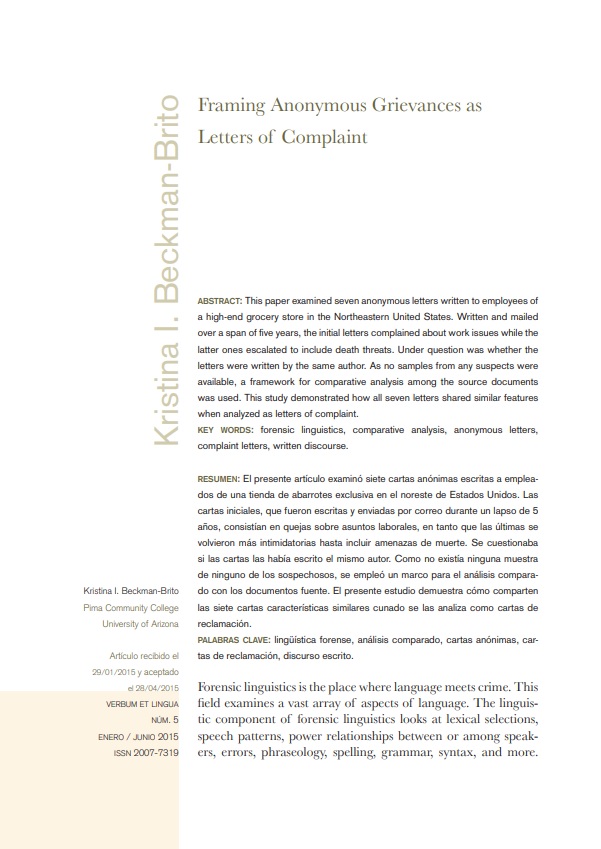Framing Anonymous Grievances as Letters of Complaint
DOI:
https://doi.org/10.32870/vel.vi5.41Keywords:
forensic linguistics, comparative analysis, anonymous letters, complaint letters, written discourseAbstract
This paper examined seven anonymous letters written to employees of a high-end grocery store in the Northeastern United States. Written and mailed over a span of five years, the initial letters complained about work issues while the latter ones escalated to include death threats. Under question was whether the letters were written by the same author. As no samples from any suspects were available, a framework for comparative analysis among the source documents was used. This study demonstrated how all seven letters shared similar features when analyzed as letters of complaint.
Downloads
References
Aswell, S. (2007) Chasing the duclod man. In Advocate, 982. Pp. 54-56
Austin, J. L. (1962) How to do things with words. Cambridge, MA: Harvard University Press.
Benet, S., & Sykes, T. A. (2004) Stop whining and start writing. In Black Enterprise, 34 (8). P. 123
Brenzinger, M.; Flora, T. & Rush, H. (2010) How to handle poison pen letters. In Security Management, 54 (2). Pp. 52-57
Calle-Martín, J. & Miranda-García, A. (2012) Stylometry and authorship attribution:
Introduction to the special issue. In English Studies, 93 (3). Pp. 251-258. doi:10.1080/ 0013838X.2012.668788
Coffin, C. (2003) Exploring different dimensions of language use. In ELT Journal: English Language Teachers Journal, 57 (1).P. 11
Fitzgerald, J. R. (2007) The FBI’s communicated threat assessment database. In FBI Law Enforcement Bulletin, 76 (2). Pp. 6-9
Foster, G. (2007) A matter of complaint. In Occupational Health, 59 (12). P. 25
Franklin, K. J. & Hardin, K. J. ( 2012) Complaints in Kewa Letters. In Oceanic Linguistics, 51 (1). Pp. 33-57
Gibbons, J. (2003) Forensic linguistics: An introduction to language in the justice system. Malden, MA: Blackwell Publishing.
Grant, K. B. (2011). How to Complain (So You Get Results). Good Housekeeping, 252(8). Pp. 105-108
Hancock, J. T.; Woodworth, M. T. & Por- ter, S. (2013) Hungry like the wolf: A word-pattern analysis of the language of psychopaths. In Legal & Criminological Psychology, 18 (1). Pp. 102-114. doi:10.1111/j.2044-8333.2011.02025.x
Hartford, B., & Mahboob, A. (2004) Models of discourse in the letter of complaint. World Englishes, 23 (4). Pp. 585-600. doi:1 0.1111/j.0083-2919.2004.00378
Hitt, J. (2012) Words on trial. In New Yorker, 88 (21). Pp. 24-29
Jiexun, L., Rong, Z. & Hsinchun, C. (2006) From fingerprint to writeprint. In Communications of The ACM, 49 (4). Pp. 76-82. doi:10.1145/1121949.1121951
Juola, P. (2012) Large-scale experiments in authorship attribution. In English Studies, 93 (3). Pp. 275-283. doi:10.1080/0013838X.2012.668792
Kotzé, E. (2010) Author identification from opposing perspectives in forensic linguistics. Southern African Linguistics & Applied Language Studies, 28 (2). Pp. 185-197. doi:10.2989/16073614.2010519111
Koppel, M.; Schler, J.; Argamon, S. & Win- ter, Y. (2012) The “fundamental problem” of authorship attribution. In English Studies, 93 (3): Pp. 284-291 doi:10.1080/001383 8X.2012.668794
Krahmer, E. (2010) What computational linguists can learn from psychologists (and vice versa). In Computational Linguistics, 36 (2). Pp. 285-294
Mostyn, M. M. (2000) The need for regulating anonymous remailers. In International Review Of Law, Computers & Technology, 14 (1). Pp. 79-88. doi:10.1080/13600860054917
Olsson, J. (2004) Forensic linguistics: An introduction to language, crime, and the law. London, England: Continuum.
Roberts, D. (2001) Don Foster has a way with words. In Smithsonian, 32 (6). Pp. 100-112.
Rudman, J. (2012) The state of non traditional authorship attribution studies—2012: Some problems and solutions. In English Studies, 93 (3). Pp. 259-274. doi:10.1080/0013838X.2012668765
Searle, J.R. (1969) Speech acts: An essay in the philosophy of language. Cambridge: Cambridge University Press.
Shuy, R. (1998) The language of confession, interrogation, and deception. Thousand Oaks, CA: Sage Publications.
Shuy, R. (2005) Creating language crimes: How law enforcement uses (and misuses) language. New York, NY: Oxford University Press.
Shuy, R. (2006) Linguistics in the courtroom: A practical guide. New York, NY: Oxford University Press.
Smith, S. S. & Shuy, R. W. (2002) Forensic psycholinguistics. In FBI Law Enforcement Bulletin, 71 (4). P. 16













